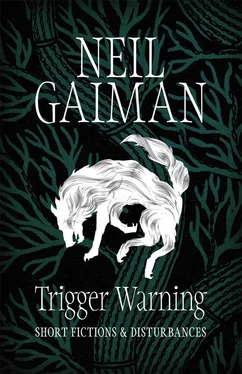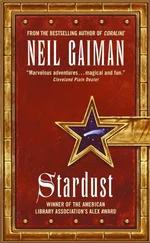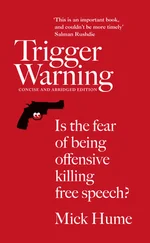Neil Gaiman - Trigger Warning - Short Fictions and Disturbances
Здесь есть возможность читать онлайн «Neil Gaiman - Trigger Warning - Short Fictions and Disturbances» весь текст электронной книги совершенно бесплатно (целиком полную версию без сокращений). В некоторых случаях можно слушать аудио, скачать через торрент в формате fb2 и присутствует краткое содержание. Год выпуска: 2015, Издательство: Headline, Жанр: Старинная литература, на английском языке. Описание произведения, (предисловие) а так же отзывы посетителей доступны на портале библиотеки ЛибКат.
- Название:Trigger Warning: Short Fictions and Disturbances
- Автор:
- Издательство:Headline
- Жанр:
- Год:2015
- ISBN:нет данных
- Рейтинг книги:4 / 5. Голосов: 1
-
Избранное:Добавить в избранное
- Отзывы:
-
Ваша оценка:
- 80
- 1
- 2
- 3
- 4
- 5
Trigger Warning: Short Fictions and Disturbances: краткое содержание, описание и аннотация
Предлагаем к чтению аннотацию, описание, краткое содержание или предисловие (зависит от того, что написал сам автор книги «Trigger Warning: Short Fictions and Disturbances»). Если вы не нашли необходимую информацию о книге — напишите в комментариях, мы постараемся отыскать её.
Trigger Warning: Short Fictions and Disturbances — читать онлайн бесплатно полную книгу (весь текст) целиком
Ниже представлен текст книги, разбитый по страницам. Система сохранения места последней прочитанной страницы, позволяет с удобством читать онлайн бесплатно книгу «Trigger Warning: Short Fictions and Disturbances», без необходимости каждый раз заново искать на чём Вы остановились. Поставьте закладку, и сможете в любой момент перейти на страницу, на которой закончили чтение.
Интервал:
Закладка:
I was scared, going out onto the stage of the Sydney Opera House, but the experience was amazing: the story was received with a standing ovation, and we followed it with an interview (artist Eddie Campbell was the interviewer) and a poem, also with FourPlay.
Six months later, we performed it again, with more paintings by Eddie, in Hobart, Tasmania, in front of three thousand people, in a huge shed at a festival, and again, they loved it.
Now we had a problem. The only people who had ever seen the show were in Australia. It seemed unfair, somehow. We needed an excuse to travel, to bring the FourPlay string quartet across the world (pop-culture-literate and brilliant musicians, they are: I fell in love with their version of the Doctor Who theme before I ever knew them). Fortunately, Eddie Campbell had taken his paintings, and done many more, and then laid out the text into something halfway between an illustrated story and a graphic novel, and HarperCollins were publishing it in the U.S. and Headline publishing it in the UK.
We went on tour, FourPlay and Eddie and me, to San Francisco, to New York, to London and to Edinburgh. We got a standing ovation at Carnegie Hall, and it doesn’t get much better than that.
And still I wonder how much of the story I wrote, and how much was simply waiting there for me, like the grey rocks that sit like bones on the low hills of Skye.
My Last Landlady
This was written for a publication of the World Horror Convention. That year, it was in Brighton. Brighton these days is a bustling, arty, go-ahead, exciting seaside metropolis. When I was a boy, though, we would go to Brighton out of season, and it was dreary and cold and murderous.
Obviously, this story is set in that long-gone Brighton and not the current one. You have nothing to be scared of if you stay in a bed-and-breakfast there now.
Adventure Story
I was asked to write this story by Ira Glass for his This American Life radio show. He liked it, but his producers didn’t, so I wrote them an op-ed instead, about how ‘adventures are all very well in their place, but there is a lot to be said for regular meals and freedom from pain’, and this story went on to be published in McSweeney’s Quarterly .
I had been thinking a lot about death, and the way that when people die they take their stories with them. It’s a sort of companion piece to my novel The Ocean at the End of the Lane, I think, at least in that respect.
Orange
Jonathan Strahan is a nice man and a good editor. He lives in Perth, Western Australia. I have a bad habit of breaking his heart by writing something for an anthology he is editing and then taking it away. I always try and mend his broken heart by writing something else, though. This is one of those something elses.
The way a story is told is as important as the story being told, although the way that the story is told is usually a little less obvious than it is here. I had a story in my head, but it wasn’t until I thought of the questionnaire format that it all fell into place. I wrote the story in airports and on the plane to Australia, where I was going to be attending the Sydney Writers’ Festival, and read it a day or so after I had landed to an audience of many people and to my pale and scary goddaughter, Hayley Campbell, whose grumblings about orange tan smears on the fridge might have inspired the story in the first place.
A Calendar of Tales
This was one of the oddest and most pleasant things I’ve done in the last few years.
When I was young, I would read Harlan Ellison’s short-story collections with delight. I loved the stories, and I loved his accounts of how the stories had come to be written just as much. I learned many things from Harlan, but the thing that I took away from his introductions that made the most impact was just the idea that the way that you wrote the stories was, you did the work. You showed up, and you did it.
And that never seemed more clear or obvious than when Harlan would explain that he had written such and such a short story in a bookshop window, or live on air on the radio, or in a similar situation. That people had suggested titles or words. He was demonstrating to the world that writing was a craft, that it was not an act of magic. Somewhere, a writer was sitting down and writing. I loved the idea of trying to write in a shop window.
But, I thought, the world had changed. You could now have a shop window that allowed hundreds of thousands of people to press their faces to the glass and watch.
BlackBerry came to me and asked if I would be willing to do a social media project, anything I wanted, and seemed perfectly happy when I suggested that I’d like to write ‘A Calendar of Tales’, each story spinning off a reply to a tweet about the months of the year – questions like ‘Why is January dangerous?’ ‘What’s the strangest thing you’ve ever seen in July?’ (Someone named @mendozacarla replied, ‘An Igloo made of books,’ and I knew what my story would be.) ‘Who would you like to see again in December?’
I asked the questions, got tens of thousands of replies, and chose twelve.
I wrote the twelve stories (March was the first, December the last), then invited people to make their own art based on the stories. Five short films were made about the process, and the whole thing was blogged, tweeted, and put out into the world, for free, on the Web. It was a joy to make stories in public. Harlan Ellison isn’t a big fan of things like Twitter, but I phoned him when the project was over, and I told him it was his fault and that I hoped it would inspire someone who had been following it, as much as his bookshop window tales had inspired me.
(My most grateful thanks to @zyblonius, @TheAstralGypsy, @MorgueHumor, @_NikkiLS_, @StarlingV, @DKSakar, @mendozacarla, @gabiottasnest, @TheGhostRegion, @elainelowe, @MeiLinMiranda, and @Geminitm for their inspirational tweets.)
The Case of Death and Honey
I encountered the Sherlock Holmes stories as a boy, and fell in love, and never forgot Holmes or the redoubtable Dr Watson who chronicled his detective work; Mycroft Holmes, Sherlock’s brother; or Arthur Conan Doyle, the mind behind it all. I loved the rationalism, the idea that an intelligent, observant person could take a handful of clues and build them up into a world. I loved learning who these people were, a story at a time.
Holmes coloured things. When I began to keep bees, I was always aware that I was merely following in Holmes’s footsteps. But then I would wonder why Holmes had taken up beekeeping. After all, it’s not the most labour intensive of retirement hobbies. And Sherlock Holmes was never happy unless he was working on a case: indolence and inactivity were death to him.
I met Les Klinger at the first meeting of the Baker Street Irregulars I attended, in 2002. I liked him very much. (I liked all the people there: grown-up women and men who, when not being eminent jurists, journalists, surgeons and wastrels, had elected to believe that somewhere it was always 1889 in 221b Baker Street, and Mrs Hudson would soon be bringing up both the tea and an eminent client.)
This story was written for Les and for Laurie King for their collection A Study in Sherlock . It was inspired by a jar of snow-white honey I was offered on the side of a mountain in China.
I wrote this story over a week in a hotel room, while my wife and my youngest daughter and her friend were at the beach.
‘The Case of Death and Honey’ was nominated for an Anthony Award, an Edgar Award, and a Crime Writers’ Association Silver Dagger Award. That it didn’t win any of them made me no less happy: I’d never been nominated for a crime-writing award before, probably never would again.
Читать дальшеИнтервал:
Закладка:
Похожие книги на «Trigger Warning: Short Fictions and Disturbances»
Представляем Вашему вниманию похожие книги на «Trigger Warning: Short Fictions and Disturbances» списком для выбора. Мы отобрали схожую по названию и смыслу литературу в надежде предоставить читателям больше вариантов отыскать новые, интересные, ещё непрочитанные произведения.
Обсуждение, отзывы о книге «Trigger Warning: Short Fictions and Disturbances» и просто собственные мнения читателей. Оставьте ваши комментарии, напишите, что Вы думаете о произведении, его смысле или главных героях. Укажите что конкретно понравилось, а что нет, и почему Вы так считаете.







